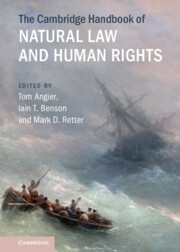Book contents
- The Cambridge Handbook of Natural Law and Human Rights
- The Cambridge Handbook of Natural Law and Human Rights
- Copyright page
- Contents
- Contributors
- Acknowledgements
- Introduction
- Part I Natural Law and the Origins of Human Rights
- Part II Natural Law Foundations of Human Rights Obligations
- Part III Natural Law and Human Rights within Religious Traditions
- Part IV The Human Person, Political Community, and Rule of Law
- Part V Rival Interpretations and Interpretive Principles
- Part VI Challenges and Future Prospects
- 32 Philosophical Challenges and Prospects for Natural Law Foundations of Human Rights
- Index
32 - Philosophical Challenges and Prospects for Natural Law Foundations of Human Rights
from Part VI - Challenges and Future Prospects
Published online by Cambridge University Press: 03 November 2022
- The Cambridge Handbook of Natural Law and Human Rights
- The Cambridge Handbook of Natural Law and Human Rights
- Copyright page
- Contents
- Contributors
- Acknowledgements
- Introduction
- Part I Natural Law and the Origins of Human Rights
- Part II Natural Law Foundations of Human Rights Obligations
- Part III Natural Law and Human Rights within Religious Traditions
- Part IV The Human Person, Political Community, and Rule of Law
- Part V Rival Interpretations and Interpretive Principles
- Part VI Challenges and Future Prospects
- 32 Philosophical Challenges and Prospects for Natural Law Foundations of Human Rights
- Index
Summary
This chapter explores some philosophical quandaries facing the natural law outlook, with particular emphasis on the prospects for a natural law account of human rights. The chapter begins by considering challenges to natural law’s reliance on the notion of human nature. It then examines the role of time in natural law theories, focusing on the question of whether natural law changes. Next, the chapter looks at the place of rights in the natural law tradition, critically discussing the suggestion that the notion of rights is at odds with the core themes of the natural law outlook, before considering what natural law has to offer to human rights theory. Finally, I turn to the place of God within natural law theories, raising the issue of whether natural law assumes a theistic worldview. I argue throughout the chapter that a hermeneutic and historicised view of natural law, which sees it as shaped by and discovered through human social practices, holds important advantages in responding to each of these challenges.
- Type
- Chapter
- Information
- The Cambridge Handbook of Natural Law and Human Rights , pp. 485 - 500Publisher: Cambridge University PressPrint publication year: 2022

